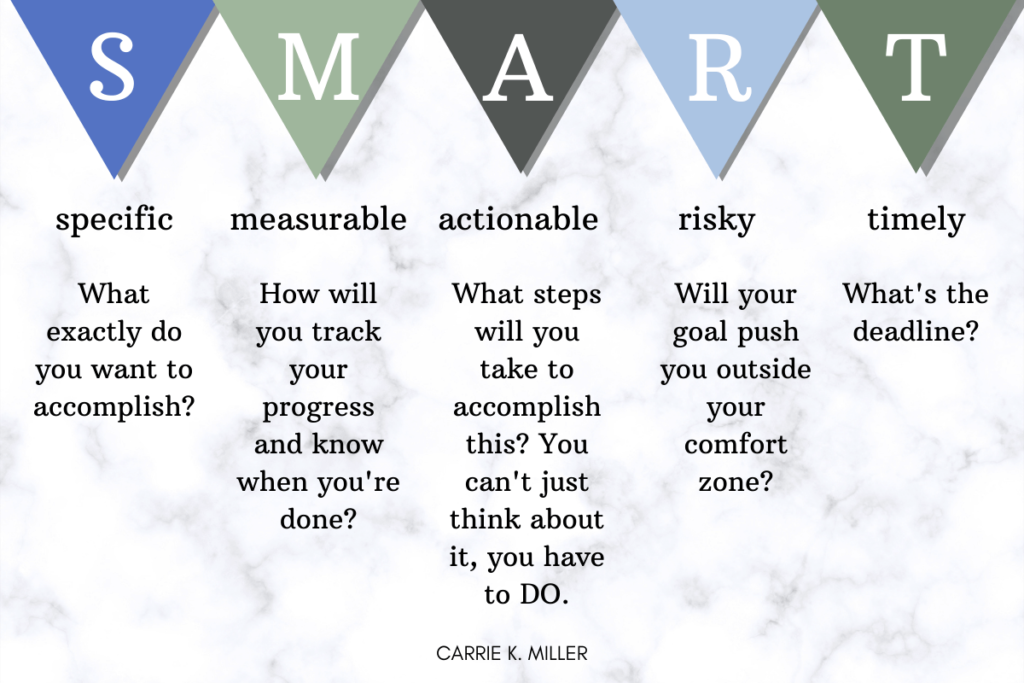Raise your hand if, nine whole days into the new year, your resolutions for 2021 are already dead in the dust. If they are, you’re not alone! It’s my personal theory that resolutions are the work of darkness, meant to keep us locked into shame and cycle of failure.
I stopped “doing” resolutions years ago because who wants to spend 363 days feeling like a failure?
Heck no, techno.
But last year I did something new and adventurous: for the first time in my life, I set annual goals for 2020. And even though it was such a wild year, I still knocked most of my goals out of the park. Here’s a taste of what I accomplished last year:
- I paid off my credit card
- I saved $5,000
- I read 48 books (surpassing my goal of 45)
- I ghostwrote a book (while working a full-time job)
- I started my own business
- I made it a habit to drink three BIG cups of water every day
If you read that and think, “Dude, I’m exhausted just from reading this list,” I feel you. I’m a Nine on the Enneagram, for crying out loud—the lowest-energy type there is.
Let me tell you how I did it: lots of dedication and hard work. No “quick and easy” schemes. But there WAS a secret sauce that fueled my dedication and hard work: goals.
If today, your resolutions have already fallen flat, it’s not too late to begin again but this time, with goals instead of resolutions.
Here are three reasons why making the switch from resolutions to goals is in your best interest:
1. Resolutions are vague. Goals are specific.
Resolutions tend to be super general, usually things like: “I’m going to lose weight.” “I’m going to get in shape.” “I’m going to pray more.” “I’m going to be a better person.”
Resolutions like this are a nice sentiment that usually lead nowhere. Sure, you may hit the gym or the running trail hard for a couple of weeks. You may crack open your bible every day for a week. But without a specific destination, it’s too easy to veer off the rails and never make it back.

Goals, on the other hand, are specific. My favorite acronym when setting goals is:
S pecific
M easurable
A ction-oriented
R isky
T imely
(Credit for this goes to Michael Hyatt!)
For example, while a typical resolution is something along the lines of, “I’m going to get healthy,” a better goal is “Starting on January 10, I’m going to eat fruits or veggies three times a day for three months.” This goal is
Specific – I know exactly what concrete action I’m going to take toward a healthier lifestyle.
Measurable – whether I use an app on my phone or an old-fashioned paper calendar, it’ll be fairly easy to track whether or not I eat fruits or veggies three times a day for three months.
Action-oriented – I have to actually eat fruits or veggies every day.
Risky – not in a life-or-death kind of way, but in a “this pushes me outside my comfort zone” kind of way.
Timely – I know exactly when I’m going to start working toward this goal, and exactly what the deadline is.
2. Resolutions are too big. Goals are break-down-able.

Those behemoth resolutions are problematic because they’re too big—another symptom of their vagueness. Of course, it’s important and necessary to set goals that stretch you and excite you, but resolutions usually die because they’re so big that there’s no clear way to begin. They lack a clear destination. With no destination, how do you ever know if you’ve accomplished what you set out to achieve? If you never know for sure you’ve achieved it, why even begin?
But goals are another story. When you use the SMART method to craft your goals, part of the work you do to achieve your goals is to break your big goals into smaller, short-term steps.
Here’s one of my 2021 goals as an example: “By December 31, 2021, earn $35,000 from my new business.” That’s a huge goal, and I have 12 whole months to get it done! But I do know the next steps I have to take in the coming weeks to get there: finish my website, reach out to small business owners, take the course I bought on how to pitch to strangers, and then start pitching! With these small steps, I can steadily work away at my big, yearlong goal.
I can begin. I can take the next step and the next step. And eventually—hopefully by December 31, but maybe earlier, maybe later—I’ll arrive.
The same goes for you and your goals.
3. Resolutions immobilize. Goals empower.

Finally, the main reason I hope you’ll make the shift from resolutions to goals is because failed resolutions feel like utter defeat, but goals allow for learning, growing, and transformation.
“Setting goals is linked with self-confidence, motivation, and autonomy.” – Dr. Marilyn Price-Mitchell
This is what I love about goals the most. Whether or not I ever accomplish the specific goals I set in January, everything I learn during the process is the true achievement. Without the goals I’ve set for myself in the last year, I would’ve never learned how to live on a budget, set up a small business account, set up a website, or write a book proposal.
In addition to these tangible, marketable, real-world skills, I’ve gained something even more valuable: confidence in myself and in my abilities to go after the things that are most important to me. Even though so many things in the world and in my life are outside of my control, I can do one thing every day to create the life I’ve always dreamed of—even if that step is small and a mere building block for what’s to come later.
Join me on Instagram for more information on goals.
Join me over on Instagram for the next few weeks—I’m going to be sharing more tips & tricks, perks, and hacks related to goal-setting. I have so much to say on this, and it doesn’t all fit in one blog post!
Blessings to you this New Year. Go crush those goals!

